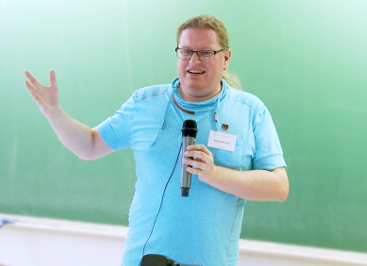Hacker and Software Liberator
by on December 17, 2019
This week we are interviewing Mark Wielaard, one of the excellent people who is supporting our annual fundraiser by putting up matching funds. This year's match is our biggest yet! We've been challenged to match a total of $113,093. Donations help us support and protect free software alternatives and grow a bold software freedom movement where everyone is welcome.

Photo at GNU Tools Cauldron 2017, courtesy of Mark Wielaard.
Mark Wielaard has a been a free software developer and advocate for a long time! He started out helping liberate Java as GNU Classpath maintainer and over the past twenty years, he has spoken publicly about his work to improve the experience of using critical free software tools including GCC and glibc and the DWARF debugging tools, elfutils and Valgrind. He's a senior principal software engineer at Red Hat working in the Engineering Tools group. Mark is passionate about building a software freedom movement that is inclusive and as bug-free as possible. He is not a huge fan of interviews, but generously agreed to answer a few questions for us anyway. Thanks, Mark!
1. What do you think is the biggest threat to software freedom today?
Centralized, non-open-standards based, communication and collaboration platforms. Personally I am perfectly happy using just email and irc. For all my personal needs I can now use my personal computer using free software. I have used a Firefox OS based phone in the past, but don't generally use a "smartphone". If you restrict yourself like that then it totally looks like we have won. There is this happy little community that has total control over their own computing. But it is a bubble. And it is getting harder and harder to get out. There are so many people who depend on communicating (and collaborating) with each other through these large centralized systems which only have proprietary (javascript) clients. It feels like it is getting harder and harder to bridge the gap.
2. What do you think free software projects should be paying more attention to over the next few years?
Besides figuring out what to do about those centralized communication/collaboration platforms I think Reproducible Builds (a Conservancy project) is really important. Even if you use only free software, you are still vulnerable to software supply chain attacks -- unless you audit and build all the software yourself. But everybody ultimately uses some binary builds produced by someone else. Reproducible Builds allow users to collaboratively "challenge" the provider of their binaries -- to trust, but verify.
3. Which Conservancy projects do you use?
As a hacker my current workflow is largely based around Git, Qemu, and Buildbot. But all Conservancy projects are useful (or just plain fun) in various situations. People really should check out the member list. If you used one of the projects and it was useful, consider hitting the Donate button.
4. Do you talk to family and friends about free software? If so, where do you usually start?
They will probably tell you I talk too much about it. These days it is easier because people very much realize they are no longer in control of their own computing devices. Sadly, software and computing have become synonymous with tracking and spyware. For their desktop or laptop I can mostly provide some free software solution. But not having much experience with mobile devices I often struggle to suggest good free software solutions there, except to suggest to avoid them if possible. Most people have become too dependent on their mobile devices to just not use them anymore.
5. Finally, what caused you to step up as a matcher for Conservancy this year?
Conservancy supports many software freedom causes and projects to which I could never productively contribute directly myself. Giving money is my indirect way to contribute. I believe it is important that Conservancy is supported by as many individuals as possible, so they can stay independent. Hopefully, the matching program inspires even more people to join, so that Conservancy can provide community projects a home where they can produce even more Software Freedom for all of us.
Participate in the match and have your donation doubled through the generosity of folks like Mark, today!
Please email any comments on this entry to info@sfconservancy.org.
